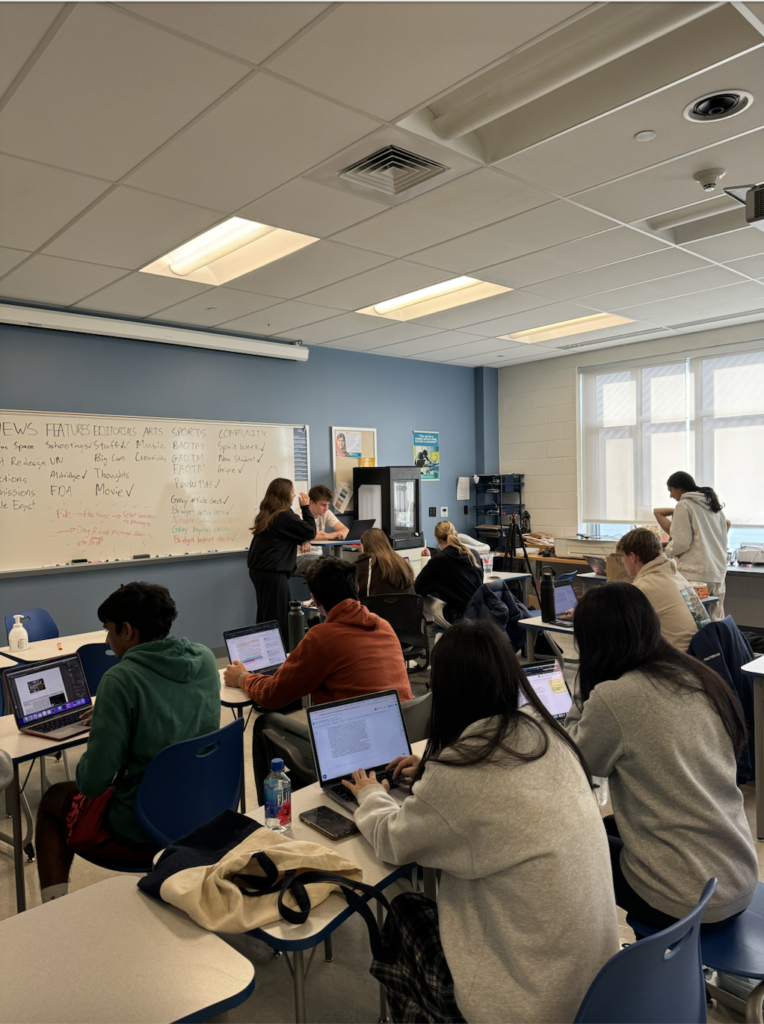Danity Pike ’27, Cloud Parker ’27
At The Episcopal Academy, the Upper School science department is known for its unique music choices: biology teacher Mrs. Jones favors modern country, chemistry teacher Mrs. Lim prefers Disney tunes, and physics teacher Mrs. Rheam often plays Imagine Dragons. While these songs accompany students during lab sessions, the effects of music extend beyond the classroom—especially during study time. EA students have their own study habits when it comes to music, with some opting for lyric-heavy songs, others choosing instrumental soundtracks, and some working best in silence. Research, however, reveals mixed results on whether music actually helps with focus.
Teachers at EA generally share similar views on the role of music in studying. Upper School science teacher Christy Rheam, for instance, listens to familiar songs to stay focused. “For my entire life, I studied best if I had music playing,” she explains. “It could be lyrical music, but it had to be music I was used to. It was just enough of a distraction to keep me from looking for other distractions.” Rheam notes that music’s impact varies, depending on the type of music and the person. “For me, it’s beneficial—that’s how I focus. But I think some people might find it distracting.”

Photo courtesy of Carter Yearley
On the other hand, Upper School Music Department Chair Jim Erwin discusses how he listens to calmer classical and jazz music while doing work. “It can’t be intense classical, like Tchaikovsky, romantic composers, or modern music. It has to be Mozart or earlier, like Baroque music.” While Mr. Erwin understands the potentially negative influence of certain genres of music on the mind, he offers that more subdued music still allows students to work efficiently without monotony.
Many EA students believe different music styles impact their focus, and they adjust their listening accordingly. Bella Winner, ’28, shares that she enjoys instrumental music for subjects like English and history. “When I’m reading, or studying English or history, I’ll listen to instrumental music. But when I’m doing any other subject, I’ll just listen to indie music,” she explains, adding that music keeps her motivated and makes studying more enjoyable. “When I’m reading a lot, I think it helps me focus and blocks out the background noise of people talking.”
Vivian Jiang, ’27, also varies her music habits based on her understanding of the material. “It depends on what class. If it’s like a difficult class, such as AP Chem, and it’s stuff that I don’t understand, the music kind of messes me up. But, if I understand the concept, then I will listen to music to help me stay focused,” she says. Jiang now prefers more “chill, dreamy East Asian or indie music,” explaining, “I used to listen to rock, but it did not help. It wasn’t beneficial, it distracted me. I would get too into the music, and then I couldn’t complete the work.”
At Episcopal, the preference to listen to music while studying seems to depend on the individual. However, research suggests certain listening habits are more beneficial than others. A study conducted by researchers at the University of Porto indicated that instrumental music could be beneficial. Lyric-heavy music, on the other hand, hindered cognitive performance in activities concerning comprehension and memory. Despite this, Healthline states that it can provide a more “positive mindset” for people, encouraging them to persist in studying or finishing work.
While music can distract students from performing mental tasks, conclusive evidence is still mixed on its holistic effects. EA students continue to shape their study habits, discovering what works best for them—whether it’s classical, indie, rock, or silence. As music fills both classrooms and study sessions, it’s become a steady part of EA’s academic environment, helping students navigate the balance between focus and creativity in their own ways.